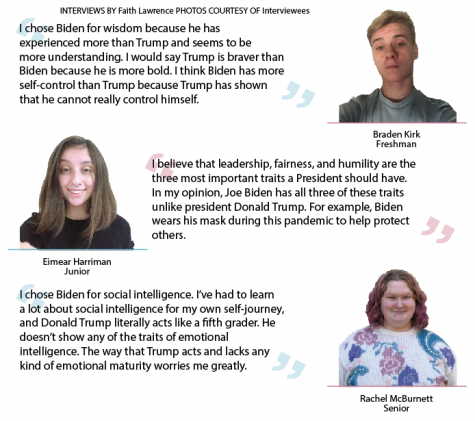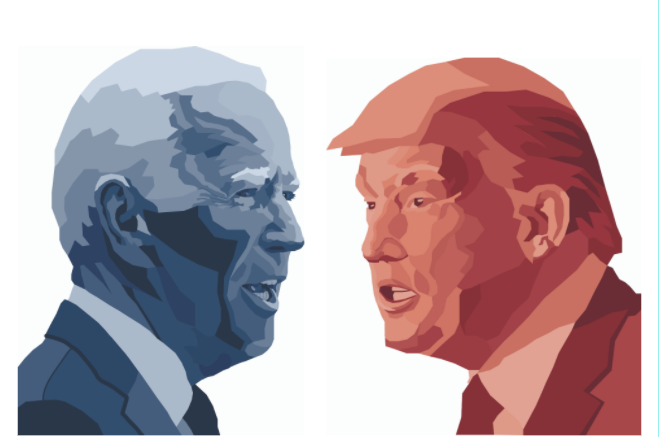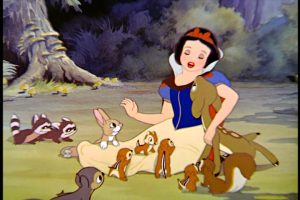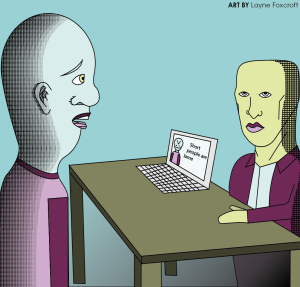The importance of character in politics
When early voting began on Tuesday, Oct. 13, registered voters faced a difficult decision: voting for the next President. Between the main two candidates, President Donald Trump and Democratic Presidential Nominee Joe Biden, the choice of who to vote for can be either extremely difficult or simple. When deciding who to vote for or endorse, Director of Oxford University’s Centre for Corporate Reputation Rupert Younger believes that an individual should first determine if they consider character to be an important part of politics.
November 2, 2020
When early voting began on Tuesday, Oct. 13, registered voters faced a difficult decision: voting for the next President. Between the main two candidates, President Donald Trump and Democratic Presidential Nominee Joe Biden, the choice of who to vote for can be either extremely difficult or simple. When deciding who to vote for or endorse, Director of Oxford University’s Centre for Corporate Reputation Rupert Younger believes that an individual should first determine if they consider character to be an important part of politics.
A research article posted on Science Direct claimed that ‘decades of research has found that voters’ electoral decisions to a significant degree are affected by character evaluations of candidates,’ however, senior Zach Hammer believes that, in a perfect society, character should not matter in the workplace, especially in political positions.
“In perfect practice, I don’t think your personality should even affect policy making,” Hammer said. “Policy is just policy, logically established rules. Inevitably, their personality bleeds into their work, in a perfect practice it shouldn’t, but it does.”
In the United States, character and politics was questioned in 1989 when the House of Representatives began the impeachment process on the current president, Bill Clinton, for his sexual activity with White House intern Monica Lewinsky, according to History.com. Clinton’s impeachment process demonstrates the American people’s difficulty with judging character and determining whether or not it matters in politics. One issue on judging character is that people may have a different definition of character and have different traits that they value.
“I think it takes both personality and policy,” history teacher Carlen Floyd said. “I want to say policy is what I’m concerned about. I have voted for people I don’t like because of their policy, but I have also voted for people because I don’t like the personality of the other candidate. If I’m honest, intellectually, I respond to the policy, but I can’t divorce myself from my emotions.”
Psychology Today reported that in 2002, psychologists Christopher Peterson and Martin Seligman attempted to measure whether a person has a good character. Peterson and Seligman found that the virtues of wisdom, courage, humanity, justice, temperance, and transcendence were important in many different cultures. They broke down those six virtues and came up with 24 character strengths.
“I think we need [a President] who is morally based, behaves correctly, and understands the vital behaviors in a professional job,” Hammer said. “I admire someone who will not cave into pressure and will stand for what they say.”
The 24 character strengths are creativity, curiosity, judgment, love of learning, perspective, bravery, perseverance, honesty, zest, love, kindness, social and emotional intelligence, teamwork, fairness, leadership, forgiveness, humility, prudence, self-regulation, appreciation of beauty, gratitude, hope, humor and spirituality.
“I personally want a President that is passionate about the issues they think have potential,” senior Nick Van Lente said. “I also like compassion; I think it’s important to respect every life that exists in our country and view us equally under the lens of public service. I think it’s important for a President to care more about the government than about themselves.”
English teacher Judd Pfeiffer believes that a President should embody the characteristics of empathy, compassion, responsibility, intelligence, and knowledge.
“A candidate’s character dictates how they implement their policies and how they represent our country, state, county, region,” Pfeiffer said. “In my opinion, responsible voters should always look at a candidate’s character, or lack thereof. If a candidate lies, makes bigoted comments, celebrates assault, spreads conspiracy theories, etc., they can’t be decent leaders.”
Floyd also values the traits of empathy, servitude, a good sense of humor, and a historical knowledge in a Presidential candidate.
“In government, we would say that no one is above the law, but, for me, it’s more than saying that,” Floyd said. “It means that you consider yourself as a servant. Even when you are making decisions or implementing policy that doesn’t make people happy, you [should] reach out in a sense of empathy, understanding and communication in a respectful way.”
PRESIDENTIAL DEBATE
The first televised Presidential Debate in the United States was in 1960 between John F. Kennedy and Richard Nixon. According to History.com, Kennedy was the apparent winner of the debate since he seemed more comfortable on camera and decided to wear makeup, unlike Nixon. Floyd believes that this first debate proved that the American population valued appearance and character in politics.
“I have found that the way a debate is structured is for entertainment rather than a presentation of policy,” Hammer said. “The [candidates] only get two minutes to answer their question, so they are kind of screwed over.”
Time Magazine claims that the first 2020 Presidential Debate will be “remembered for its antagonistic tone, and the din of the candidates talking over each other” more than any other political debate in the past.
“I think it showed, especially with Trump, how immature [the candidates] are, and how they can’t even put aside their differences for one night, have a mature debate and get their policies across,” sophomore Fionella Caputo said.
During the debate, both candidates acted unprofessional, according to senior Laine Smith. Biden frequently told Trump to ‘shut up,’ and called Trump a ‘clown.’ Additionally, Van Lente claimed that Trump repeatedly attacked Biden, even bringing up Beau Biden’s, Biden’s son, drug addiction.
“In politics, there’s kind of the unstated rules that exist with general courtship,” Van Lente said. “In a political situation, the politician’s personal lives don’t really matter and are pretty much off limits.”
CANCEL CULTURE
Dictionary.com defines ‘cancel culture’ as “withdrawing support for public figures and companies after they have done or said something considered objectionable or offensive.” With the emergence of TikTok, a video-sharing social networking service, cancel culture has become more widespread.
“I feel like celebrities are not as important as politicians,” Caputo said. “I think that Presidential candidates should be held higher than celebrities because they are the people serving our country.”
Cancel culture involves people on the internet ‘canceling’ or withdrawing their support for popular figures when the celebrity does something a viewer perceives as morally wrong.
“An interesting thing about morals is something that is immoral to some people is not immoral to others,” Floyd said. “I think flagrant violations of both the spirit and letter of the law should make people reevaluate their support for someone.”
Business Insider reported that 26 women have accused Trump of sexual assault and eight women have accused Biden of innapropriate behavior and touching. However, popular YouTuber Shane Dawson was ‘cancelled’ due to reports of his sexual statements towards children and Willow Smith when she was 11-years-old, according to Insider. While Dawson lost most of his fan support because of these accusations, Biden and Trump have not faced compatible repercussions despite their political careers.
“The whole cancel culture thing is so gross; it has so many double standards,” Smith said. “But I definitely think that if cancel culture should apply to anyone, it should apply to politicians because they are representing [America].”
POLARIZATION
By definition, political polarization is the vast and continuously growing gap between liberals and conservatives as well as Republicans and Democrats, according to the Pew Research Center.
“Nobody wants to be told, especially as adults, to broaden your horizons,” Floyd said. “When you have a firmly held political belief, you tend to surround yourself with media and social circles that reinforce that belief. A notion of an echo chamber means that you’re just hearing the same thing over and over and over.”
An article in Vice claimed that a person will never be able to change another’s mind about politics unless presented with facts. However, Floyd believes that the social media echo chamber makes it almost impossible for people to view informative and factual posts that go against their own political beliefs.
“Whatever cult-like following Trump has is based on political polarization,” Hammer said. “I would also say his following can be based on his character and personality. Trump is not your orthodox candidate, he’s pretty loud, he’s pretty boisterous. People like that he is abrasive.”
On the opposite side, people who consider themselves leftists and are former Bernie Sanders and Elizabeth Warren supporters began an organization called “Settle for Biden.” The organization dislikes some of Biden’s policies, but supports the Democratic candidate because they believe not supporting Biden would endanger the lives of millions of Americans, as they believe Trump is a threat to the future of Americans’ lives.
“I’m receptive of bold ideas, bold ideology and bold stances and I even went to a Bernie rally,” Van Lente said. “What I do know is that a person who goes against everything that me and my ideology stands for is running for President, and that is an existential issue for me. If that means I have to settle for Joe Biden, who isn’t horrible, I will. I’ll take what I can get.”
While people between the ages 18 to 29 favor Biden over Trump by about 20 points, according to polls by Morning Consult and YouGov, census data created by the United States Elections Project shows that only 43 percent of registered voters under the age of 30 voted in the 2016 Presidential election in comparison to 60 percent of voters over the age of 60. This data shows that young voters typically align with Democratic values, but they statistically vote less than older voters.
“I think that settling is the best thing that we can do,” Caputo said. “Biden is better and has more progressive [policies] than Trump. Biden is the best person for our country. I think he is going to lead to less division, help climate change, and [improve] health care. I think he appeals to the people and is doing more for the people than Trump is, and I think that is what we need in office right now.”
STUDENT POLLING DATA
The traits below were generated in a study by psychologists Christopher Peterson and Martin Seligman in 2002. Peterson and Seligman found that the virtues of wisdom, courage, humanity, justice,
temperance, and transcendence were important in many different cultures. Peterson and Seligman broke these six virtues into 24 smaller parts, called “character strengths.” The poll asked which 2020 Presidential Candidate most embodies the character strengths. To view all 24 results, visit thedispatchonline.net.













